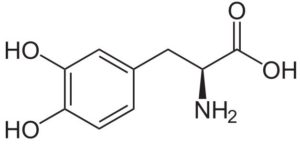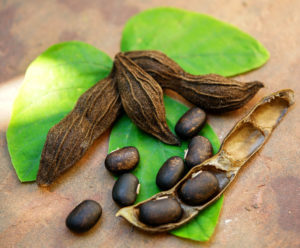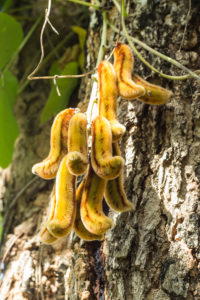Table of Contents
Key Takeaways
- L-DOPA is a vital amino acid precursor of neurotransmitters dopamine, epinephrine, and norepinephrine synthesized in the brain from l-tyrosine.
- Mucuna Pruriens is a natural source of L-DOPA, used as a nootropic to enhance brain function by increasing dopamine levels.
- L-DOPA from Mucuna Pruriens can improve memory, cognition, mood, and overall brain health while reducing stress and acting as an antidepressant.
- Opt for organic Mucuna Pruriens extract with higher L-DOPA concentrations (15% – 30%) to ensure better tolerance and efficacy, avoiding synthetic versions used for Parkinson’s treatment.
- Nootropic use of L-DOPA is generally safe and well-tolerated, but caution is necessary to avoid tolerance and dependence issues.
See my article on all of the supplements that have been shown to help with Parkinson’s here: Best Supplements for Parkinson’s Disease
L-DOPA (levodopa, L-3,4-dihydroxyphenylalanine) is an amino acid synthesized in your brain by the amino acid l-tyrosine. L-DOPA is a precursor of several neurotransmitters including dopamine, epinephrine, and norepinephrine.
Mucuna Pruriens contains naturally occurring L-DOPA in high concentrations. And is used as a nootropic because dopamine itself cannot cross the blood-brain barrier.
Dopamine and norepinephrine are essential for memory, cognition, and a positive mood. A lack of either of these neurotransmitters can lead to a lower mood state, loss of memory, brain fog, poor energy, and more. And if left unchecked will eventually result in neurodegenerative diseases like Parkinson’s.
L-DOPA helps:
- Brain Health. L-DOPA helps to increase growth hormone levels in the brain. Boosting the production of neurons and glia cells affecting the formation of memories, and overall brain health.
- Neurotransmitters. L-DOPA is a necessary precursor for your brain to make dopamine. And dopamine is then synthesized into the neurotransmitters epinephrine, and norepinephrine. Affecting cognition, learning, memory, movement, motivation and pleasure.
- Neuroprotection. L-DOPA produces neuromelanin which is similar to the melanin pigment in your skin. In your brain they absorb toxic quinones, and chelate heavy metals like mercury and lead.
Overview
L-DOPA (levodopa, L-3,4-dihydroxyphenylalanine) is an amino acid that’s naturally synthesized in your brain by the amino acid l-tyrosine.

L-DOPA is a necessary precursor to the synthesis of the neurotransmitter dopamine. Called a catecholamine, dopamine is then synthesized into the other catecholamines epinephrine (adrenaline) and norepinephrine (noradrenaline).
Unlike Dopamine, L-DOPA can cross the blood-brain barrier. This is why we supplement with L-DOPA rather than dopamine.

And for a dopamine boost, neurohackers use Mucuna Pruriens, which contains high levels of L-DOPA.[i] This legume, native to the tropical regions of India, Africa and the West Indies, and also known as velvet bean, has been used in Ayurveda medicine since 1500 B.C.
The ancients used Mucuna Pruriens to treat things like snakebite, intestinal problems, sexual issues, and a melancholy mood.
Raising levels of the neurotransmitter dopamine in your brain helps regulate mood and cognition.[ii]
Mucuna Pruriens vs. L-DOPA: What’s the Difference?
Mucuna Pruriens is an extract of the velvet bean plant that grows 3 – 18 meters in height. L-DOPA (levodopa) is usually synthetic and made in the lab.
The natural version of L-DOPA from Mucuna Pruriens is generally well-tolerated by most people. And the compounds in the plant are bio-identical to those chemicals naturally made in your body. Not so with synthetic L-DOPA.
Synthetic L-DOPA is metabolized into dopamine in your body by an enzyme called aromatic L-amino acid decarboxylase (AADC). And the majority of synthetic L-DOPA will be converted peripherally (not in the central nervous system and brain). This can cause problems.
So when used therapeutically, as in treating Parkinson’s Disease, L-DOPA is administered in combination with an inhibitor of peripheral AADC. Drugs like carbidopa (or other AADC inhibitors) ensure most of the L-DOPA is preserved for conversion to dopamine in the brain. And not the rest of your body.
This is critical for nootropic users to keep in mind. Chronic, or prolonged use of synthetic L-DOPA can lead to things like dyskinesia. This is a movement disorder where neurological discoordination results in uncontrollable, involuntary movements.[iii]
I am not telling you this to dissuade you from using L-DOPA. Stick with an extract of Mucuna Pruriens and you should be fine.
How does L-DOPA Work in the Brain?
L-DOPA boosts brain health and function in several ways. But two in particular stand out.
- L-DOPA improves memory. It’s metabolized into dopamine in your body by an enzyme called aromatic L-amino acid decarboxylase (AADC). This increases dopamine levels in your brain.
Researchers at the University of Münster in Germany conducted a study with 40 healthy people. In this randomized double-blind study, they gave one group 100 mg of levodopa daily for 5 days. The other group took a placebo.
90 minutes later on each day, subjects were given a memory test based on vocabulary. The study found that levodopa significantly enhanced the speed, overall success, and long-term retention of novel words.[iv]
- L-DOPA promotes brain health. Research suggests Mucuna Pruriens protects your brain by regulating cognitive and neural functions. And even encouraging neural activity.
Researchers in India showed that Mucuna Pruriens is a potent antioxidant. They performed assays to evaluate the enzymatic and nonenzymatic antioxidants in extracts. They found high levels of flavonoids, alkaloids, tannic acids, gallic acids, quercetin equivalents, and sitosterol equivalents.[v]
All of these compounds scavenge for free radical in your brain. Free radicals are formed during normal brain activity, like the synthesis of ATP that is produced in your mitochondria.
Your brain is equipped to eliminate some of these free radicals on its own. But especially in today’s environment in which we live, your brain is overwhelmed. Free radicals cause inflammation which damages and can kill brain cells. Affecting memory, learning, recall, cognition and mood.
Mucuna Pruriens has been proven to be a very effective brain inflammation fighter. It even has the ability to chelate heavy metals like mercury and lead in brain cells. And it’s antibacterial.[vi]
Mucuna Pruriens helps your brain make naturally occurring neuronal pigments called neuromelanin’s. They’re similar to the melanin found in your skin. And they’re often found in regions of your brain where dopamine is active.
The synthesis of neuromelanin’s in the various regions of your brain is an important protective process. The melanic component is generated through the removal of reactive/toxic quinones that would otherwise cause neurotoxicity.
This melanic component promoted by Mucuna Pruriens is what chelates and accumulates toxic, heavy metals like mercury and lead.[vii] Preventing them from damaging brain cells.
How things go bad
As we get older, our brain chemistry and energy metabolism changes.
↓ Dopaminergic neurons are damaged or die
↓ Dopamine levels decline
↑ Stress levels increase
↓ Long-term memory and mood decline
All of these age-related changes are contributing factors to the neurodegenerative diseases of aging, including Parkinson’s Disease.
L-DOPA benefits for brain health
Mucuna Pruriens natural herbal supplement extract contains high levels of L-DOPA, the precursor to the crucial neurotransmitter dopamine. Dopamine is further synthesized into the neurotransmitters epinephrine (adrenaline) and norepinephrine (noradrenaline).
Dopamine plays a critical role in learning and absorbing new information. Increasing brain levels of dopamine helps regulate mood and boosts cognition.
Research also suggests that Mucuna Pruriens provides antioxidants that defend against oxidative damage caused by free radicals.[viii]
How does L-DOPA feel?
Neurohackers report that using Mucuna Pruriens helps in multi-tasking, improving motivation, more focus, less stress, and a sense of calm.
You could find your energy levels increase, less brain fog, and a boost in overall mood. A more positive outlook on life. And an increase in libido.
L-DOPA Clinical Research
Mucuna Pruriens (L-DOPA) as an
alternative for Parkinson’s Disease
Researchers at the Parkinson’s Institute located at the University of Milan in Italy recruited 18 patients with advanced Parkinson’s Disease. The patients were given either ground Mucuna Pruriens powder (standardized 5.7% L-DOPA) or prescription form of levodopa containing a dopa-decarboxylase inhibitor. And then measured motor improvements at 60 and 90 minutes after using the supplement or drug.
The researchers found Mucuna Pruriens standardized powder produced reduced Parkinson’s symptoms equivalent to the prescription version of levodopa. But with significantly fewer problems with dyskinesias. The team concluded the “Clinical effects of high-dose Mucuna Pruriens were similar to levodopa alone at the same dose, with a more favorable tolerability profile“.
Mucuna Pruriens reduces stress
A study was conducted to assess the role of Mucuna Pruriens in infertile men. It was done at King George’s Medical University in Lucknow, India. The study included 60 men who were undergoing infertility screening. And no surprise here; were found to be suffering from stress.
The control group in this study were 60 age-matched men who had initiated at least one pregnancy. The infertile men were given 5 grams of Mucuna Pruriens seed powder per day for 3 months. Semen samples were collected at the beginning of the study. And after 3 months of treatment.
The researchers found that treatment with Mucuna Pruriens significantly decreased stress levels. And increased sperm count to the same level as the fertile control group of men.
They “concluded that M. pruriens not only reactivates the anti-oxidant defense system of infertile men but it also helps in the management of stress and improves semen quality.”[ix]
L-DOPA improves learning
This study in Germany was done with 40 healthy subjects. They were given 100 mg of L-DOPA or a placebo for 5 days in a randomized, double-blind trial.
Subjects were trained on artificial vocabulary using a high-frequency, repetitive approach. This was done 90 minutes after L-DOPA administration on each day of the trial.
The researchers found that L-DOPA significantly enhanced the speed, overall success, and long-term retention of the words.[x]
L-DOPA as an anti-depressant
Increasing dopamine in your brain also boosts your mood and libido. This study was done in India with mice. Researchers used the well-known Forced Swimming Test (FST), Tail Suspension Test (TST), and Chronic Unpredictable Mild Stress (CUMS) test.
The mice were fed Mucuna Pruriens seed extract, and then evaluated while performing, well… what mice do in the lab. The research team found that Mucuna Pruriens seed extract has significant antidepressant qualities. Which would simply verify what we already know in humans.[xi]
Using Mucuna Pruriens extract is a great anti-depressant.
L-DOPA Recommended Dosage
L-DOPA (Mucuna Pruriens extract) suggested dosage for cognitive benefits is 250 – 500 mg twice per day. Most Mucuna Pruriens extracts only contain 15 – 20% L-DOPA. So you may need to adjust your dose up or down depending on how you respond to this supplement.
You may also find that you need to cycle the use of L-DOPA (Mucuna Pruriens). And use it only 4 or 5 days a week. This can help avoid tolerances and dependencies (which are common with any dopamine agonist). DO NOT attempt to cycle this nootropic if you are using it to treat Parkinson’s Disease.
If you are using Mucuna Pruriens extract (L-DOPA) for Parkinson’s Disease you will likely need 500 – 1,000 mg Mucuna Pruriens 3 or more times per day. And look for a Mucuna Pruriens extract (98% L-DOPA).
See my article on all of the supplements that have been shown to help with Parkinson’s here: Best Supplements for Parkinson’s Disease
L-DOPA Side Effects
L-DOPA is produced naturally in your body. So is considered well-tolerated and safe. And L-DOPA from Mucuna Pruriens extract is particularly well tolerated by most people.
Research shows that the natural form of L-DOPA from Mucuna Pruriens compared to synthetic versions of L-DOPA provides similar results. But without the common side effects of nausea, vomiting, and involuntary muscle movement.[xii]
But be very careful when working with dopamine. Too much and you can experience symptoms like hair loss, auditory or visual hallucinations, psychosis, Dyskinesia and more.
Of course, if you begin to experience any of these side effects, stop supplementing with L-DOPA (Mucuna Pruriens) immediately.
Like any natural supplement, it’s always better to use an organic source.

Type of Mucuna Pruriens (L-DOPA) to buy
Mucuna Pruriens is typically available in powder, capsule or tablet form. Some are pure, dried Mucuna Pruriens powder.
Several manufacturers offer Mucuna Pruriens extracts ranging from 15% – 30% L-DOPA. Or they tell you how many mg of L-DOPA is in each capsule or tablet.
A few manufacturers call it “Velvet Bean Extract” or “Mucuna Extract” with the percentage of L-DOPA in each capsule or tablet. It’s the same as Mucuna Pruriens.
Try to find “organic” or “certified organic” if you can. And for Nootropic use, avoid synthetic L-DOPA which is typically used to treat Parkinson’s Disease.
Nootropics Expert Recommendation
L-DOPA (Mucuna Pruriens) dosage 250 – 500 mg twice per day
 I recommend using L-DOPA as a nootropic supplement.
I recommend using L-DOPA as a nootropic supplement.
Your body does synthesize some L-DOPA on its own. And converts it into the essential neurotransmitters dopamine, epinephrine, and norepinephrine.
But as you get older, dopamine receptors die or become unresponsive. Or your body doesn’t convert the necessary amino acids well enough to supply the neurotransmitters you need for an optimized brain.
L-DOPA is helpful to boost energy and motivation levels, memory, clear brain fog, improve mood and libido.
L-DOPA is especially helpful for those suffering from neurodegenerative diseases like Parkinson’s. And the natural form of L-DOPA from Mucuna Pruriens often offers better results with fewer side effects than prescription drugs.
I suggest starting with a dose of 100 – 250 mg twice daily for nootropic use at first. And you may find that you need to cycle L-DOPA. Use it for 4 or 5 days and take a break. Tolerance is often a problem when working with dopamine. As is dependence or addiction.
If you are using Mucuna Pruriens (L-DOPA) for Parkinson’s Disease, please see my article on all of the supplements that have been shown to help with Parkinson’s here: Best Supplements for Parkinson’s Disease









Join The Discussion - 380 comments
L.R Luis
January 3, 2024
Hi David, Happy New year.
I was wondering If I can take Mucuna with Alcar, not necessarily together, but let’s say Alcar about 250mg in the morning and then a small dosage of mucuna in the evening? With Mucuna 3-4 times a week and Alcar maybe 5 days a week? Can this work? I have good experience with both Alcar and Mucuna so I thought maybe I can take them together in a single day like this.
WIth Alcar I feel ON and energetic and with Mucuna, in general, I feel pretty good and positive. So can these two together work, technically?
David Tomen
January 4, 2024
Luis, follow the dosage recommendations for both. You can use them together.
Ryan
December 14, 2023
Hi David, hope you’re having a good day.
When it comes to tolerance/dependency to L-DOPA, is it caused by a downregulation of tyrosine or DOPA hydroxylase? Or dopamine receptors?
David Tomen
December 14, 2023
Ryan, my experience is it depends on your age and how much dopamine you need to support what you are not producing naturally. If you get your dosage right you will not grow tolerant.
The other thing is dopamine and serotonin need to be in balance. If all you do is increase dopamine you end up suppressing serotonin.
And finally, I do not recommend using L-DOPA to increase dopamine unless you are dealing with Parkinson’s. If you are not then it is safer and easier to dose using L-Tyrosine. The other thing is you need L-Tyrosine to produce thyroid hormone. L-DOPA does not do that. Only L-Tyrosine.
BTW, these natural supplements do not “desensitize” receptors. Drugs do can do that but not supplements.
Ryan
December 30, 2023
Suppressing serotonin is part of my goal so that’s OK. Tryptophan worsens my anxiety and L-DOPA seems to be anxiolytic for me after a few days of use.
So if I’m taking L-DOPA, will it shut down Tyrosine’s production of thyroid hormone? Or are you saying that I’m just missing that extra benefit if I take L-DOPA instead of Tyrosine?
Also, Kratom doesn’t desensitize receptors? I wonder how its withdrawal works in that case. I’m pretty sure Phenibut desensitizes GABA(B) receptors but I guess that’s more of a drug.
David Tomen
January 4, 2024
Ryan, I am saying that you are missing that extra benefit if you take L-DOPA instead of Tyrosine.
And Kratom does not desensitize receptors as far as I know. The withdrawal that some get from quitting Kratom is largely due to its effects on opioid receptors. You can become accustomed to that benefit and when you stop using it then your system complains.
Ryan
January 4, 2024
Okay, thanks for the help David.
I’m curious what you think of this theory that tyrosine hydroxylase is too rate-limited for L-Tyrosine as a supplement to effectively increase dopamine in someone who already gets enough protein in their diet.
I’ve read a lot of posts from this particular person and they seem quite knowledgeable, but from reading your posts here on nootropicsexpert.com it seems you’d disagree with this particular tyrosine theory. Just curious what your thoughts are.
David Tomen
January 9, 2024
Ryan, that is assuming you are getting enough of that amino acid in your diet. That is not something you can count on in 2024 because of industrial farming and what it has done to our food supply. And your age because as we get older our system cannot convert these amino acids to the point where they are useful.
Theory is fun to debate but the bottom line is what works for you. If you use L-Tyrosine and it does not help you either you do not need more dopamine. Or it’s a bad supplement.
Scott
October 30, 2023
Hi – can you explain your dosage recommendations for adult wanting more focus/energy/etc. I see you say 200mg-ish twice per day – is that for the powder itself OR is that the mg. of the actual l-dopa contained within. I use powder that is standardized to 15% l-dopa. Thank you!
David Tomen
October 31, 2023
Scott, that is the problem with Mucuna Pruriens is there is no consistent dosage so I can make an intelligent recommendation on how much to use. That’s why I usually recommend L-Tyrosine to increase dopamine unless you are dealing with Parkinson’s.
Best to try different dosages until you find one that works for you. But avoid going above 1,000 mg per dose because long-term it’ll cause problems.
Andrei
October 25, 2023
Hi there,
I might have misunderstood some of the article. I thought that Mucuna would give L-DOPA, as a precursor the for dopamine and the rest. And then you’ve mentioned it being an agonist and having to cycle it. Am I misunderstanding something?
Also, should L-Tyrosine be cycled? Or could it be used on the days that Mucuna is not used as an option?
Thank you!
David Tomen
October 27, 2023
No one need to use L-DOPA unless you are dealing with Parkinson’s. If your goal is to increase dopamine then all you need is L-Tyrosine. The other benefit of using Tyrosine is it helps make thyroid hormone. L-DOPA does not.
todski17
October 11, 2023
Thank You for sharing vital information. Are there any study references on low dose therapy or optimal delivery methods?
David Tomen
October 12, 2023
Do you mean low dose of L-DOPA? Because if so, one thing you do not need to worry about is optimizing delivery. Unless you have a really messed digestive system. This will help produce dopamine within 30 minutes. But “low dose” will not do you much good because this L-DOPA is an extract of Mucuna Pruriens. And extract strength varies usually only 20 – 30%.
Marc
October 5, 2023
Hi David,
Does mucuna pruriens have synergy with aniracetam or oxiracetam? I can’t find anything about it in your articles. Have you experience with that stack? I have great results from mucuna and the racetams but never tried them together. Could it be beneficial?
David Tomen
October 6, 2023
Matt, not sure if I would call it “synergy” but Aniracetam seems to somehow affect dopamine D2 receptors. But not Oxiracetam.
Kiro
September 21, 2023
Hi David
What about taking Mucuna Pruriens with vortioxetine (Trintellix) ? is there any contreindactions?
many thanks
David Tomen
September 22, 2023
Kiro here is the list of drugs and supplements contraindicated with vortioxetine: https://www.drugs.com/drug-interactions/vortioxetine-index.html
Andrei
September 5, 2023
If properly used, not exceeding dosages, rotating usage, would you suggest Mucuna or L-Tyrosine, when adding to a Concerta stack(or even without), considering all their respective benefits?
Thank you David
David Tomen
September 6, 2023
L-Tyrosine is safer to use long-term and easier to dose.
Daniel
January 16, 2024
Hey David, do you think mucuna puriens can boost testosterone if taken in normal dosages ike 250-500 per day? Or is it too low?
David Tomen
January 17, 2024
Daniel, likely too low a dose. The best thing I’ve found to naturally boost testosterone (other than testosterone replacement therapy) is this: https://bit.ly/3vB221X